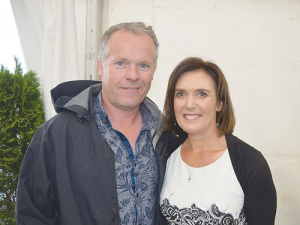Another Windfall for Fonterra Farmers, Unit Holders
Fonterra farmer shareholders and unit holders are in line for another payment in April.
 She’s back – re-elected Fonterra director Leonie Guiney with husband Kieran at the co-op’s annual meeting earlier this month.
She’s back – re-elected Fonterra director Leonie Guiney with husband Kieran at the co-op’s annual meeting earlier this month.
Fonterra's inconclusive director election is raising questions among shareholders.
As predicted in the last Rural News, the revised director voting threw a hung result: only two candidates passed the 50% ‘yes’ vote threshold, leaving one director vacancy unfilled.
Federated Farmers Waikato president Andrew McGiven believes the election process needs better transparency.
Expressing surprise that the co-op only elected two directors to fill three board vacancies, McGiven says shareholders are demanding clarification.
“There is still a lot of conjecture around this, hence the dissatisfaction among shareholders who nominated the two outside candidates,” he says.
“I think the farmer message to the board is that they are accountable to us as shareholders. I don’t know why the other two board nominees were not elected, but I think there is a clear message to the board -- and to a certain extent senior management -- that they aren’t greater than Fonterra itself, and in the end are accountable to us as shareholders and suppliers.”
Five candidates contested the board elections; the board backed three candidates through the independent nomination process: sitting director Ashley Waugh and new candidates Peter McBride and Jamie Tuuta.
Two candidates -- Leonie Guiney and John Nicholls -- were nominated by farmers. Only McBride and Guiney were successful.
Guiney, who served a three-year term on the board, thanks shareholders for trusting her.
“I take that responsibility very seriously; it’s a very strong mandate, a mandate to protect the coop’s assets for the long term, but also to reallocate our resources to where we are most competitive,” she told Rural News.
“For me this was the test of whether farmers were engaged enough to create constructive change. They are: 68% came out and voted.
“When co-op members care enough to vote the co-op has a future, and when the board members have a strong mandate from their members the board can get on with their job while retaining one of the greatest advantages a co-op has -- loyal supply.”
Guiney had a testy relationship with the previous chairman John Wilson; a court case between Guiney and the board over alleged leaking of confidential information was settled out-of-court after Wilson stepped down as chairman in July.
McBride, the outgoing chairman of Zespri, was overwhelmed with the response in the election.
“I want farmers to know I will do my very best and I will work hard for them,” he told Rural News. “It was a good result. I was quite surprised at the outcome with only two people making it through but I guess that is the system.”
He says going into the election he was concerned the farmers may “just see me as a kiwifruit guy”.
“But I think when they got to meet me in person and heard what I had to say then they understood I had something to offer.”
Waugh, a sitting director, refused to comment on his ousting from the board.
Biggest losers
So, who are the biggest losers from the flawed Fonterra director election process?
The two board-backed candidates Ashley Waugh and Jamie Tuuta- who exposed themselves to the rigorous process and were hung out to dry.
The shareholder Council, which ran the process. The system is flawed and the council got the mood of the farmers completely wrong.
The independent assessment panel who vetted possible candidates and recommended three candidates to the board. Only one candidate was successful. Why would these top business minds offer themselves to sit on a committee, whose recommendation is ignored by farmers?
The Meat Industry Association of New Zealand (MIA) today announced that Chief Executive Officer Sirma Karapeeva has resigned from the role.
The winners of the 2026 Hawke’s Bay/Wairarapa Dairy Industry Awards were announced at the annual awards dinner held at Copthorne Solway Park in Masterton on Thursday evening.
Environment Southland is welcoming this week’s decision by the Environmental Protection Authority (EPA) to approve the release of Blaptea elguetai, a leaf‑feeding beetle that will help control the highly invasive Chilean flame creeper.
This March, the potato industry is proudly celebrating International Women’s Day on 8 March alongside the International Year of the Woman Farmer, recognising the vital role women play across every part of the sector — from paddocks and packhouses to research, leadership, and innovation.
Fruit trader Seeka posted a record profit and returns to shareholders in 2025.
Recent weather events in the Bay of Plenty, Gisborne/Tairawhiti, and Canterbury have been declared a medium-scale adverse event.

OPINION: A mate of yours truly reckons rural Manawatu families are the latest to suffer under what he calls the…
OPINION: If old Winston Peters thinks building trade relations with new nations, such as India, isn't a necessary investment in…